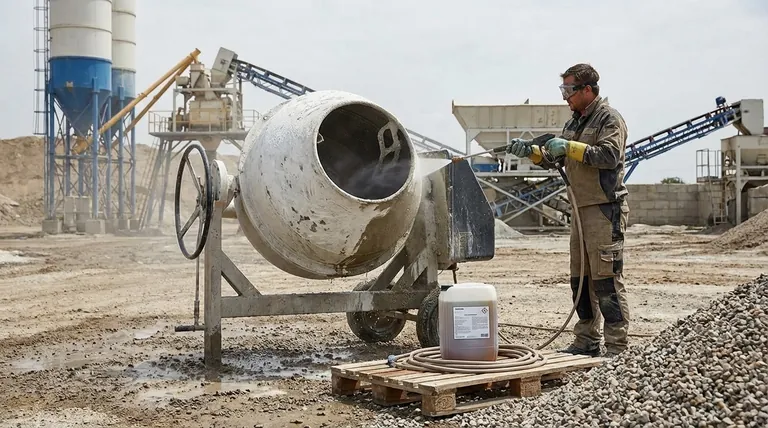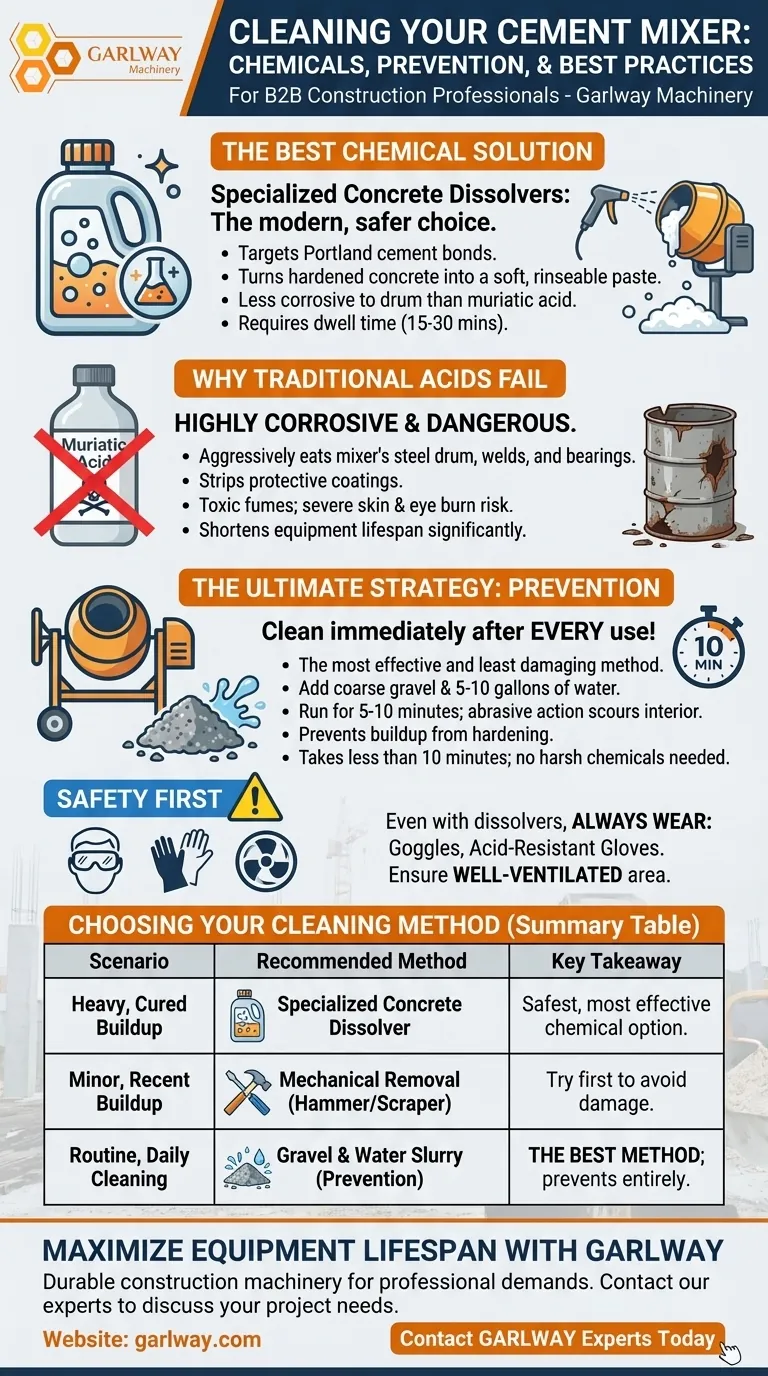The most effective chemical for cleaning hardened concrete from a cement mixer is a specialized, acid-based cleaner known as a concrete dissolver. Unlike harsh traditional acids, these modern formulations are engineered to break down the Portland cement in concrete, turning it into a soft, rinseable mud without aggressively corroding the mixer's metal drum.
The best chemical is a concrete dissolver, but the best overall strategy is prevention. While dissolvers can restore a neglected mixer, nothing is more effective or less damaging than cleaning the drum with water and gravel immediately after every use.

How Concrete Dissolvers Work
Modern concrete removers offer a targeted chemical attack that is far safer and more controlled than older, more dangerous methods.
The Chemical Action
A concrete dissolver is typically a synthetic acid or a buffered acid solution. It works by specifically targeting and dissolving the bonds within the Portland cement that hold the sand and aggregate together.
Once applied, the chemical penetrates the hardened concrete, turning the solid mass back into a soft paste. This softened material can then be easily removed with a scraper and water.
The Application Process
The process is straightforward. The chemical is sprayed or foamed onto the dry, hardened concrete inside the drum.
After being left to sit for a recommended "dwell time" (usually 15-30 minutes), the softened concrete is scraped or chiseled out. A final rinse with a high-pressure washer removes any remaining residue.
Why Traditional Acids Are a Poor Choice
For years, muriatic (hydrochloric) acid was the go-to solution, but its use is now strongly discouraged by professionals for critical reasons.
Extreme Corrosive Damage
Muriatic acid is highly corrosive to steel. It will aggressively eat away at the mixer's drum, welds, and bearings, significantly shortening the lifespan of the equipment. It also strips away any paint or protective coatings.
Significant Safety Risks
The fumes from muriatic acid are toxic and can cause severe respiratory damage. Direct contact results in immediate and severe chemical burns to the skin and eyes. It represents an unacceptable level of risk for routine maintenance.
Understanding the Trade-offs
Chemicals are a powerful tool, but they are not the only solution. Understanding when and why to use them is key.
Chemical vs. Mechanical Cleaning
Chemicals are best for thick, old, or widespread buildup where mechanical removal would be too time-consuming or ineffective.
Mechanical methods, such as a hammer and chisel or an air scaler, are effective for smaller, localized chunks of concrete. However, they carry a high risk of denting and damaging the drum if not done carefully.
The True Cost
While effective, concrete dissolvers are more expensive than generic acids and require patience as the chemical needs time to work. The primary cost, however, is the labor and downtime required for a deep clean.
The Non-Negotiable Need for Safety
Even though modern dissolvers are safer than muriatic acid, they are still acidic chemicals. Always wear goggles, acid-resistant gloves, and ensure you are working in a well-ventilated area to avoid inhaling fumes.
The Best Method: A Proactive Approach
The most effective way to manage concrete buildup is to prevent it from ever hardening in the first place.
Clean After Every Single Use
The single most important maintenance task is to clean the mixer immediately after you finish pouring the last batch. This process takes less than ten minutes and requires no chemicals.
The Gravel and Water Slurry
The professional's method is simple: add a few shovels of coarse gravel or crushed stone and 5-10 gallons of water to the drum. Let the mixer run for 5-10 minutes. The abrasive action of the gravel slurry will scour the interior clean, preventing any concrete from hardening.
Choosing the Right Cleaning Strategy
- If you have heavy, fully-cured concrete: A specialized concrete dissolver is the most effective and least damaging chemical tool for restoring the mixer.
- If you have minor, recent buildup: Start with mechanical removal (a hammer and scraper) before resorting to chemicals, as you may be able to clear it without them.
- For routine, daily maintenance: The absolute best method is prevention—clean the mixer immediately after use with a simple slurry of gravel and water.
Ultimately, proactive cleaning is the key to ensuring your equipment remains in optimal condition for years of service.
Summary Table:
| Cleaning Scenario | Recommended Method | Key Takeaway |
|---|---|---|
| Heavy, Cured Buildup | Specialized Concrete Dissolver | Safest, most effective chemical option. |
| Minor, Recent Buildup | Mechanical Removal (Hammer/Scraper) | Try this before using chemicals to avoid damage. |
| Routine, Daily Cleaning | Gravel & Water Slurry (Prevention) | The best method; prevents buildup entirely. |
Keep Your Construction Projects Running Smoothly
A clean, well-maintained cement mixer is vital for productivity and profitability on any job site. GARLWAY specializes in providing durable construction machinery, including robust concrete mixers, winches, and batching plants, designed for the demands of professional contractors and construction companies.
Let us help you maximize your equipment's lifespan and performance. Contact our experts today to discuss your project needs and discover how our reliable machinery can deliver superior value for your business.
Visual Guide

Related Products
- HZS75 Concrete Batching Plant Cement Mixer Price Concrete Mixer Bunnings Mixing Plant
- Concrete Cement Mixer Machine Drum Mixer for Construction
- JZC1000 Industrial Concrete Mixer Machine Cement Mixer Price
- Auto Concrete Cement Mixer Machine New
- JDC350 Small Cement Concrete Mortar Mixer
People Also Ask
- How much does a batching plant cost? Uncover the True Investment for Your Project
- What are the disadvantages of ready mixed concrete? Navigate Logistical & Cost Risks
- What can you mix in a cement mixer? Unlock Its Full Potential for Concrete & Beyond
- Do you put water or cement in a cement mixer first? Master the Professional Layering Method
- How do I choose a cement mixer? Find the Perfect Match for Your Project Scale and Power Needs



















